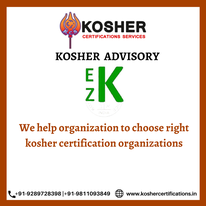Kosher certification is more than just a stamp of approval—it’s a gateway to expanding your market reach; for businesses looking to grow and attract new customers, obtaining Kosher certification can open doors to a broad range of markets, both locally and internationally. This certification not only appeals to Jewish consumers but also attracts those who seek high-quality, ethical, and trustworthy food products. In this blog, we will explore how Kosher certification can help businesses reach a wider audience and grow their market presence.
1. Access to the Jewish Market
One of the most significant advantages of Kosher certification is the ability to tap into the Jewish market. Jewish consumers are required to follow specific dietary laws, and Kosher-certified products meet those needs. By offering Kosher-certified products, businesses can cater to this loyal and diverse customer base, which spans across various industries, including food, beverages, cosmetics, and more.
Kosher-certified products are in high demand, particularly in Jewish communities worldwide, including in North America, Europe, and Israel. By obtaining certification, your business can stand out to Jewish consumers who prioritize adhering to these dietary laws.
2. Appeal to Health-Conscious Consumers
Kosher certification is also associated with high standards of quality and cleanliness, making it an attractive option for health-conscious consumers. Many people—whether or not they are Jewish—choose Kosher foods because they believe they are free from harmful additives, preservatives, and other non-ethical ingredients. The Kosher certification process often includes stringent inspection and ingredient checks, which increases consumer trust.
Consumers today are more informed and selective about the foods they purchase, and many prefer products that are Kosher-certified due to the perceived quality and safety standards.
3. International Market Expansion
Kosher certification agency can be a key to unlocking international markets. In countries like Israel, where the majority of the population observes Kosher dietary laws, having a Kosher-certified product is almost essential for doing business. However, even outside of Israel, Kosher products are in demand due to the global Jewish diaspora.
Additionally, Kosher certification often complies with strict food safety and hygiene standards, which can make products more appealing in international markets where consumers are highly concerned about food quality and safety. This can provide a competitive advantage in global markets.
4. Boost to Brand Image and Trust
Obtaining Kosher certification enhances a brand’s image by showcasing a commitment to quality, transparency, and ethical practices. When consumers see a certification label on a product, they know that it has been scrutinized by a reputable Kosher certification agency, adding credibility to the product and the company.
For businesses looking to establish long-term trust with their customers, Kosher certification can be a powerful tool for increasing brand loyalty and reputation.
5. Increased Retail Opportunities
Many large retailers, both online and brick-and-mortar, are looking for Kosher-certified products to expand their offerings to diverse consumer groups. Having Kosher certification can make it easier for your business to partner with these retailers and increase your product’s visibility on store shelves and e-commerce platforms.
Retailers understand the demand for Kosher products. And those who do not yet carry Kosher items are often eager to add them to attract new customers.
Conclusion
Kosher certification can significantly expand your market reach by opening up opportunities in Jewish and international markets. Appealing to health-conscious consumers and boosting your brand’s credibility. By obtaining certification, your business can tap into a growing. Diverse consumer base and position itself as a trustworthy and high-quality brand. Whether you are a small business or a large enterprise. Certification is a valuable investment for expanding your market presence and increasing sales.

